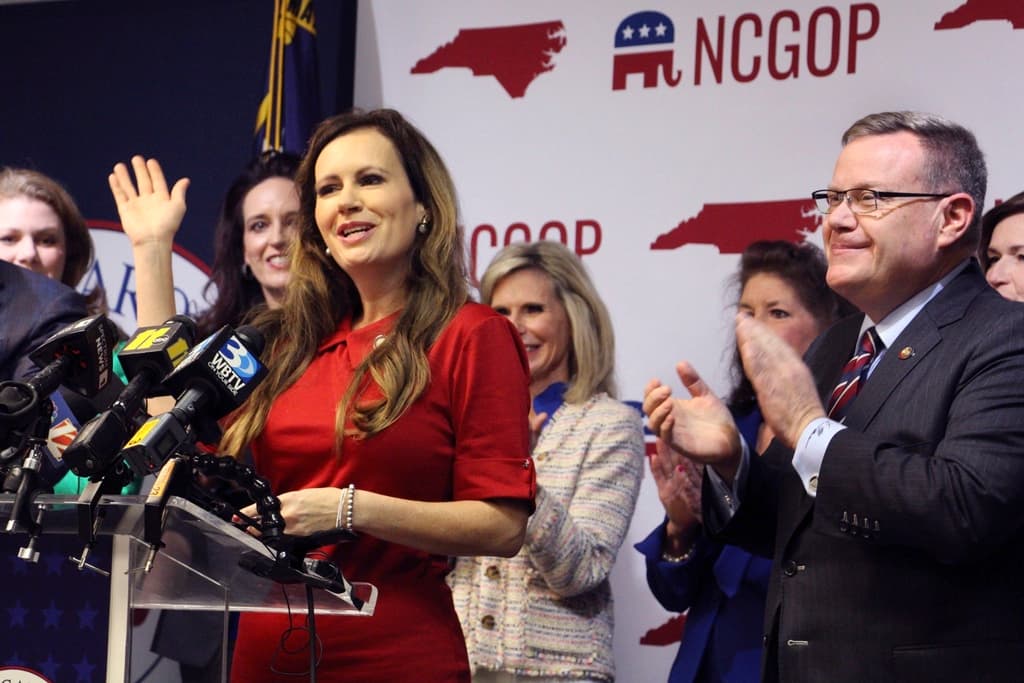You’ve Heard About RINOs but What About DINOs?
While concern over DINOs on the left might seem to suggest a more heterogeneous party, the increased attention directed at these lightning rod figures may actually suggest the opposite.

President Trump constantly berates the Republicans who refuse to kowtow to his whims as “Republicans in Name Only,” or RINOs. Now, Democrats on the party’s left flank are beginning to complain about what they call “Democrats in Name Only,” or DINOs, after a high-profile party switch in the Tar Heel State.
The press had a field day with the departure of a North Carolina state representative, Tricia Cotham, from the Democratic Party Tuesday because her switch to the Republican Party delivered the GOP a supermajority in the state legislature, sidelining the Democratic governor, Roy Cooper.
“This modern day Democratic Party has become unrecognizable to me,” Ms. Cotham said at a press conference. “The party wants to villainize anyone who has free thought.”
Her party switch led to an avalanche of calls for her resignation from state Democrats and some of her constituents, as well as allegations that Ms. Cotham misled voters about her beliefs and used the Democratic Party to secure her election.
One Democratic political commentator, Kaivan Shroff, called Ms. Cotham a “traitor to democracy” and said that she betrayed her voters by switching parties.
“Understand, not only did she betray her voters,” Mr. Shroff said. “Now the entire state — which elected Democratic Governor Roy Cooper — will be held hostage by an extremist Republican legislature.”
Ms. Cotham, though, isn’t the only so-called Democrat in Name Only — or, in her case, former Democrat — who made headlines this week.
Look no further than the former CEO of Chicago Public Schools and Democratic candidate for mayor of Chicago, Paul Vallas, who lost the election to Mayor-elect Brandon Johnson on Tuesday night.
Mr. Vallas’s campaign was dogged by allegations that he was a Republican in disguise, an accusation arising from a 2009 comment from Mr. Vallas when he said he planned to run for Cook County Board as a Republican.
While he did not end up running, the comment, his embrace of Republican-style rhetoric on crime, and widespread support among Chicago’s Republicans was enough to at least help deliver the race to Mr. Johnson.
Before Ms. Cotham and Mr. Vallas, Senator Sinema shook up the political landscape when she decided to leave the Democratic Party to become an independent after the 2022 midterms.
Ms. Sinema exited the party after years of being one of the most conservative Democrats in the Senate. Both Ms. Sinema and Senator Manchin spent most of 2021 and 2022 being attacked for being “DINOs.”
Back in 2018, Senator Casey suffered similar attacks over his position on abortion. Mr. Casey has long characterized himself as a Democrat who opposes abortion and has occasionally positioned himself alongside Republicans on the issue, despite a voting record resoundingly in favor of reproductive rights.
While it seems like there’s been an uptick in DINOs in recent years, the focus on more conservative Democrats and those leaving the Democratic Party might actually be a symptom of a dying breed.
An associate editor at Sabato’s Crystal Ball at the University of Virginia’s Center for Politics, Miles Coleman, told the Sun that, because there are fewer DINOs these days, “the ones who are left get more attention.
“Pelosi’s career, to me, speaks to this change,” Mr. Coleman said. “During her first tour of duty as speaker, the conservative members were usually the thorns in her side. From 2018 to 2022, it was often the progressives.”
According to Mr. Coleman, a party’s moderate members often secure any majorities a party wins even if there are fewer moderate elected officials than there used to be. President Biden’s 2020 victory also proves that moderate candidates still have broad appeal. Still, the relative scarcity of moderate members make them easy targets for criticism.
One example of how the Obama-era Democratic Party differs from today’s party is in the push to pass the Affordable Care Act. After the 2008 election, there were dozens of Democrats in the House from districts that Senator McCain carried handily, which made it difficult to whip support for the bill.
“The parties are more sorted now, so the mavericks like Manchin — who is still a vote for leadership on most things — emerge as easier lightning rods for progressive criticism,” Mr. Coleman said.

